 I love a good dream. I don't remember ever suffering from nightmares, but I have had some great dreams over the years. I'm not sure why we do it other than it might be the way we kick start the brain into action in the morning. Other than being a pleasant escape from our earthly bounds, I have always looked upon dreams as being rather symbolic. I'm sure psychologists would have a field day analyzing mine.
I love a good dream. I don't remember ever suffering from nightmares, but I have had some great dreams over the years. I'm not sure why we do it other than it might be the way we kick start the brain into action in the morning. Other than being a pleasant escape from our earthly bounds, I have always looked upon dreams as being rather symbolic. I'm sure psychologists would have a field day analyzing mine.
My most common dream is revisiting the homes and places I lived during my youth. Interestingly, there have been few changes made to the houses and I instinctively know where everything is. Sometimes I meet with old friends and relatives who have passed away a long time ago, as well as those still alive. My favorite of this genre is going back to my old high school for a football game where the current coach asks me to suit up to go play my old position on the line. I'm pleasantly surprised by the request, but eagerly ready myself as I relish the opportunity to play again. I know the kids are younger, faster and stronger than I am now, but I surprisingly hold my own in the game.
Since I was young, I've experienced Déjà vu dreams. I learned if I awoke and could remember the dream, it would never come true, but if I woke up and couldn't remember it, the dream would indeed come true. I would see the Déjà vu played out well after I've had the dream, sometimes weeks later, sometimes months or even years later. Most of my dreams in this capacity are not significant, I just realize I've already experienced the moment. Interestingly, I seem to have had more Déjà vu dreams in my youth, but as I grow older they become fewer and far between. Maybe I'm just running out of ideas.
In my 20's I experienced a recurring dream of frustration whereby I am running around the old cinder track at my high school's athletic field whereby I am running into a powerful force of wind pushing against me. To compensate, I ask my body to run as hard as it can, calling on every muscle to work harder, going to the point of seeing my blood vessels pumping from my body. Yet, with every stride I take, my progress is resisted. Then, all of a sudden, I hear the footsteps of another runner coming from behind me. I turn my head only to see a much smaller man rush by me unimpeded by the wind and sprinting away. I then stop and watch him in disbelief. So vivd was this dream that I would often wake up in a sweat. I experienced this for several years but it seemed to disappear around the time I turned 40. I guess this is why I abhor running any long distance, even to this day.
Perhaps the most exhilarating dreams I've had are those where I fly. I love my flying dreams and I am actually quite good at taking to the air. In most cases, I just extend my arms, hands and body to form a sort of kite. The wind then gently pushes me up into the air and I find that if I move my hands and body ever so slightly I can move in just about any direction I want. As I live in Florida, I love to fly away from my house and up and over to the beaches and out to a nearby island where I meet my family. Once airborne, I want to stay aloft for hours at a time but inevitably return home. I'm told, dreams of flight are indicative of accomplishment. Regardless of the reason, it is a hoot.
Now in my 50's I have developed a new recurring dream and I am not certain what it means or why I have it. Nonetheless, I dream I am an exhausted Doughboy in World War I returning to my trench in France. Although there are small rooms dug into the ground which serve as bunk houses for soldiers, I have elected to dig my own hole and line it with two parallel sheets of corrugated steel which I believe will protect me from the Germans. I've placed a hinge on one of the steel panels, thereby allowing me to drop one of the panels down and enclose myself in a small room safe from the elements and the enemy. I am wearing a full American uniform, complete with the old flat helmets of the period, along with leggings and boots. This seems a bit strange to me as my grandfather had served in the English Army during the war. Concerned for my safety, I pull out my bayonet and stick it in the ground so I can easily grab it in case of emergency. On it, I hang my gas mask so I can get to it quickly in case of attack. I sleep with my Springfield rifle loaded and near me for protection. I feel dirty and my feet are tired, but as I'm exhausted I am just grateful to be able to fall asleep, which I do. Again, I don't know how or why this dream developed, as I see it all in meticulous detail, but it has been a regular part of my nightly repertoire for the last few years. Maybe it's from a former life.
I don't try to analyze my dreams as I just enjoy them as they come along. I have met a lot of people who tell me they do not dream at all. Frankly, they don't know what they're missing.
One last thing; I dream in color.
Keep the Faith!
Note: All trademarks both marked and unmarked belong to their respective companies.
 Tim Bryce is a writer and the Managing Director of M. Bryce & Associates (MBA) of Palm Harbor, Florida and has over 30 years of experience in the management consulting field. He can be reached at timb001@phmainstreet.com
Tim Bryce is a writer and the Managing Director of M. Bryce & Associates (MBA) of Palm Harbor, Florida and has over 30 years of experience in the management consulting field. He can be reached at timb001@phmainstreet.com
For Tim's columns, see:
http://www.phmainstreet.com/timbryce.htm
Like the article? TELL A FRIEND.
Tune into Tim's THE BRYCE IS RIGHT! podcast Mondays-Fridays, 7:30am (Eastern).
Copyright © 2011 by Tim Bryce. All rights reserved.
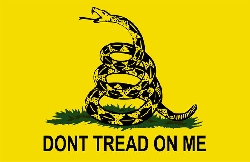 Last February, following the takeover of the House of Representatives by the GOP, I wrote an article entitled,
Last February, following the takeover of the House of Representatives by the GOP, I wrote an article entitled,  On September 8th, 2011, President Obama unveiled his
On September 8th, 2011, President Obama unveiled his  Over the last year we have been watching a major upgrade to the highway in front of our office. It's not a large project, just an enhancement of a two-lane highway (three-lanes in some parts) spanning approximately five miles. It is being implemented by the state's Department of Transportation (DOT), and not by the county, which I guess we should be grateful for. Nonetheless, the project has been a model of bureaucracy and inefficiency. Planners consulted with local property owners to advise them how their establishments would be affected by new curbing and sidewalks. Some of it will likely hinder business and when the merchants complained, the DOT turned a deaf ear to them. They quickly discovered their voices were not being heard and the DOT took the arrogant attitude of presuming they knew what was best for business, not the merchants.
Over the last year we have been watching a major upgrade to the highway in front of our office. It's not a large project, just an enhancement of a two-lane highway (three-lanes in some parts) spanning approximately five miles. It is being implemented by the state's Department of Transportation (DOT), and not by the county, which I guess we should be grateful for. Nonetheless, the project has been a model of bureaucracy and inefficiency. Planners consulted with local property owners to advise them how their establishments would be affected by new curbing and sidewalks. Some of it will likely hinder business and when the merchants complained, the DOT turned a deaf ear to them. They quickly discovered their voices were not being heard and the DOT took the arrogant attitude of presuming they knew what was best for business, not the merchants.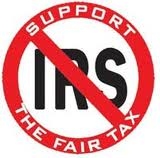 I prepared my first IRS 1040 income tax form back when I was in my early 20's, and it really hasn't changed too much over the years. Back then, the form looked innocent enough, but the instruction booklet was a bit overwhelming. Nonetheless, I patiently persevered and was able to complete the form, deductions and all. It was quite an experience and I still prepare my own taxes to this day. Over the years I have tried tax preparation software, but frankly I didn't see what it was saving me. Aside from accountants, the 1040 form is a labyrinth of head scratching instructions. If you study the tax tables closely, you can readily see how the more income you take in, the more taxes you have to pay. It's no small wonder why people keep receipts and look for any type of deduction imaginable, regardless how minuscule it is. It is overtly complicated and casts a shadow of doubt as to its fairness. This is compounded by stories we hear whereby 50% of U.S. households pay no federal income tax whatsoever. This is probably why we dread the thought of April 15th, Tax Day.
I prepared my first IRS 1040 income tax form back when I was in my early 20's, and it really hasn't changed too much over the years. Back then, the form looked innocent enough, but the instruction booklet was a bit overwhelming. Nonetheless, I patiently persevered and was able to complete the form, deductions and all. It was quite an experience and I still prepare my own taxes to this day. Over the years I have tried tax preparation software, but frankly I didn't see what it was saving me. Aside from accountants, the 1040 form is a labyrinth of head scratching instructions. If you study the tax tables closely, you can readily see how the more income you take in, the more taxes you have to pay. It's no small wonder why people keep receipts and look for any type of deduction imaginable, regardless how minuscule it is. It is overtly complicated and casts a shadow of doubt as to its fairness. This is compounded by stories we hear whereby 50% of U.S. households pay no federal income tax whatsoever. This is probably why we dread the thought of April 15th, Tax Day. Good question. This is something we all demand but I don't think we really know what fair is; to illustrate:
Good question. This is something we all demand but I don't think we really know what fair is; to illustrate: In front of our office, the state is about to start a highway construction project. Over the years I've learned such projects take an inordinate amount of time to plan and implement in Florida, seemingly forever, but they usually produce a good roadway when it is finished. What takes weeks or months to do up north, seems to take years in the south. As part of the planning process, we had a county bureaucrat visit our office to ask us about our sewer connection. He hemmed and hawed for a long time before he finally got to the point. I found it rather bothersome that he had no problem wasting my time. Maybe he is used to wasting time, I'm not. I just wanted him to get to the point.
In front of our office, the state is about to start a highway construction project. Over the years I've learned such projects take an inordinate amount of time to plan and implement in Florida, seemingly forever, but they usually produce a good roadway when it is finished. What takes weeks or months to do up north, seems to take years in the south. As part of the planning process, we had a county bureaucrat visit our office to ask us about our sewer connection. He hemmed and hawed for a long time before he finally got to the point. I found it rather bothersome that he had no problem wasting my time. Maybe he is used to wasting time, I'm not. I just wanted him to get to the point. I recently heard a talking head on one of the political talk shows on television make the claim that despite the billions sunk into the "War on Poverty" since the mid-1960's, the national poverty level has essentially remained unchanged. This really caught me off guard as I assumed money can correct a lot of social ills, particularly poverty. Surely the talking head must have been wrong on this one. As I was to find out, he was correct.
I recently heard a talking head on one of the political talk shows on television make the claim that despite the billions sunk into the "War on Poverty" since the mid-1960's, the national poverty level has essentially remained unchanged. This really caught me off guard as I assumed money can correct a lot of social ills, particularly poverty. Surely the talking head must have been wrong on this one. As I was to find out, he was correct.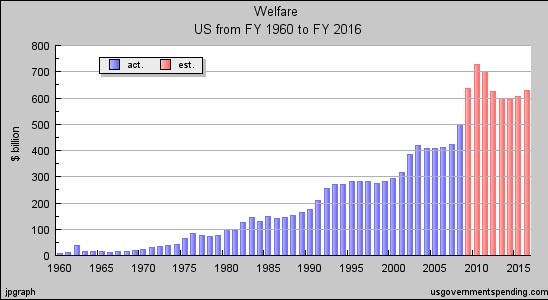
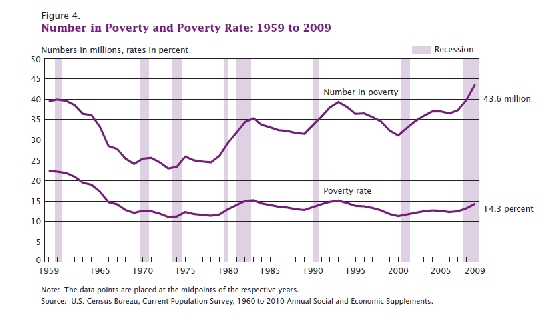
 I was recently talking to a young man in a local I.T. company who was lamenting how he was overlooked for a promotion. He had been with the company for a year, thought he was doing a good job, and fully expected to be promoted to a job at a higher pay level. He didn't get it. Somewhat miffed, he was considering jumping ship to look for another job elsewhere. In response, I asked him about the stability of the company and its future potential, which he admitted was good. I then asked what kind of assignments he had worked on over the last year and his success rate. Although he raved about his work effort, he admitted he had been late and over budget on some tasks, but was quick to proclaim, "I work my butt off in there; I put in 45 hours a week." I replied that managers are more interested in results, not necessarily the amount of time going into it. Frankly, 45 hours doesn't impress me and I told him so.
I was recently talking to a young man in a local I.T. company who was lamenting how he was overlooked for a promotion. He had been with the company for a year, thought he was doing a good job, and fully expected to be promoted to a job at a higher pay level. He didn't get it. Somewhat miffed, he was considering jumping ship to look for another job elsewhere. In response, I asked him about the stability of the company and its future potential, which he admitted was good. I then asked what kind of assignments he had worked on over the last year and his success rate. Although he raved about his work effort, he admitted he had been late and over budget on some tasks, but was quick to proclaim, "I work my butt off in there; I put in 45 hours a week." I replied that managers are more interested in results, not necessarily the amount of time going into it. Frankly, 45 hours doesn't impress me and I told him so. It's probably not much of a secret that one of the biggest differences between men and women is in the area of grooming and personal hygiene. Women tend to be more fastidious than men in this regard. The male of the species is lucky if he remembers to shave or run a comb through his hair. Whereas men spend no more than 5-10 minutes in the bathroom to get ready in the morning, women can be in there for days. Maybe this has something to do with military training. Nevertheless, women tend to have an eye for imperfections and go to great lengths to correct them. Men couldn't care less and refer to their imperfections as "character."
It's probably not much of a secret that one of the biggest differences between men and women is in the area of grooming and personal hygiene. Women tend to be more fastidious than men in this regard. The male of the species is lucky if he remembers to shave or run a comb through his hair. Whereas men spend no more than 5-10 minutes in the bathroom to get ready in the morning, women can be in there for days. Maybe this has something to do with military training. Nevertheless, women tend to have an eye for imperfections and go to great lengths to correct them. Men couldn't care less and refer to their imperfections as "character." As I write this article, President Obama has just departed on his summer vacation to Martha's Vineyard. Following Labor Day he is to return to Washington and make a major speech regarding his proposals for mending the economy and putting the country back to work. As of this moment, the scuttlebutt is he may announce some new tax cuts and reforms, construction projects to stimulate jobs, even a new "Jobs Department" in the government. This is all speculative at this time. Nonetheless, we are told it will be bold and fresh new ideas. Although we all certainly hope this is true, we have already been down this road with the president under the guise of "Change we can believe in."
As I write this article, President Obama has just departed on his summer vacation to Martha's Vineyard. Following Labor Day he is to return to Washington and make a major speech regarding his proposals for mending the economy and putting the country back to work. As of this moment, the scuttlebutt is he may announce some new tax cuts and reforms, construction projects to stimulate jobs, even a new "Jobs Department" in the government. This is all speculative at this time. Nonetheless, we are told it will be bold and fresh new ideas. Although we all certainly hope this is true, we have already been down this road with the president under the guise of "Change we can believe in."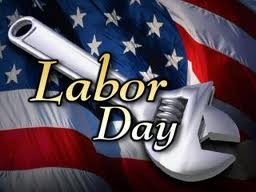 I always thought Labor Day was an oddball holiday. It became a federal holiday in 1894 and is observed on the first Monday in September. Whereas holidays like Memorial Day and Independence Day recognized fallen veterans and the nation's birth, I was never quite sure what Labor Day stood for other than perhaps another paid holiday for the labor unions. For most of us, it represents the end of summer and the start of a new school year. This has changed in recent times though as schools are now more inclined to start earlier, well before Labor Day.
I always thought Labor Day was an oddball holiday. It became a federal holiday in 1894 and is observed on the first Monday in September. Whereas holidays like Memorial Day and Independence Day recognized fallen veterans and the nation's birth, I was never quite sure what Labor Day stood for other than perhaps another paid holiday for the labor unions. For most of us, it represents the end of summer and the start of a new school year. This has changed in recent times though as schools are now more inclined to start earlier, well before Labor Day.